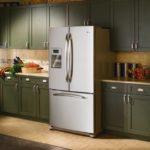To repair any household appliances, you need to know how it works so as not to harm the device during its operation. In this article we will talk about what the principle of operation and the device of the refrigerator are, and describe its structural elements.
Compressor-based refrigerator design
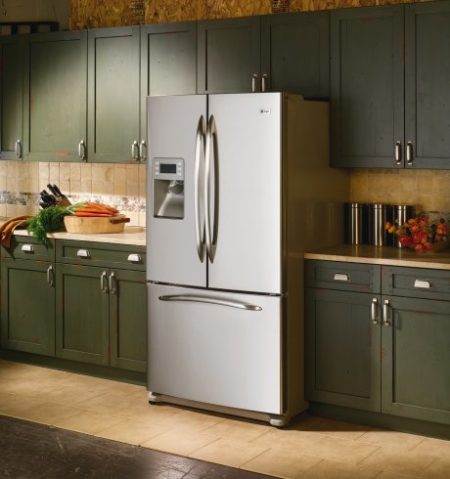
In modern everyday life, mainly units operating with a compressor are operated, so we will consider this particular the principle of operation of the refrigerator. They consist of the following elements:
- compressor - this device by means of a piston pumps the refrigerant in the form of gas, it also creates different pressures in different areas;
- vapor chamber - This is a small container into which "liquid" gas enters, and it absorbs the heat that came from the refrigerator compartment;
- capacitor - in this chamber, the gaseous substance gives off its heat to the space surrounding it;
- temperature regulator - maintains the necessary temperature in the refrigerator, which is set according to the selected mode;
- refrigerants - it is a chemical mixture of various gases circulating through the refrigerator system using a compressor, and in certain areas it gives off or takes away heat. Most often, Freon is used in this system.
See also:
- 7 best Bosch refrigerators according to customer reviews
- 8 best Samsung refrigerators according to customers
- 9 best cheap refrigerators according to customers
- 10 best LG refrigerators according to customer reviews
The principle of operation of the unit
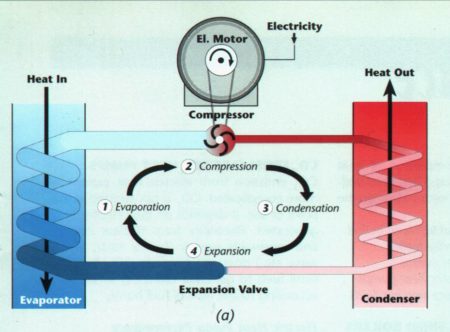
The most important thing to understand how the refrigerator works you need to understand the fact that this compressor-type device itself “creates” cold. It arises due to the ongoing process inside the unit system - the refrigerant gives off its heat, which is subsequently released into the external environment. As mentioned above, the most common substance for this is Freon, which is used in these refrigeration circuits.
So, the operation of the refrigerator is arranged on cycles that proceed as follows:
- Freon enters the evaporation chamber, and passing through it takes heat from the refrigerator;
- then the refrigerant goes to the compressor, which distills it into a condenser;
- passing through the above system, consisting of spirals located in the walls of the refrigerator, freon goes through a cooling cycle and turns into a liquid-like element;
- the cooled refrigerant enters the evaporator, and during the transition into a tube of a larger diameter, it turns into a gaseous mixture by lowering the pressure, after which it again takes heat from the refrigerator.
This cycle will be repeated until the required temperature set by the system program is formed in the refrigerator. As soon as it falls below the programmed mark, the cycle will resume again.
![]() See also - Is it possible to put hot in the refrigerator?
See also - Is it possible to put hot in the refrigerator?
Compressor unit in the refrigerator
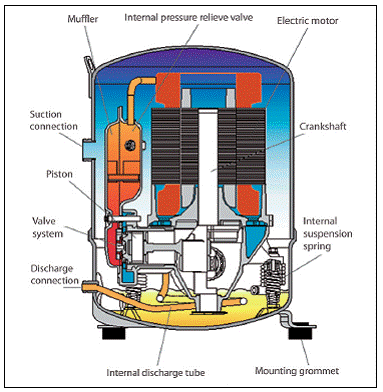
This is perhaps the most important part due to which the cooling refrigerant circulates through the system. In modern refrigerators, inverter control of the device is used, thereby the creators have achieved the extension of the life of the “engine” of the unit.
For more efficient functionality, a start-up relay is used, which is aimed at protecting the compressor from overheating. It is responsible for the activation factor of the starting winding. Since the compressor has a non-synchronous type of operation, inside it a metal part heats up as it works, when it reaches a certain temperature, the relay will turn off the system in order to prevent overheating.
Two-chamber refrigerators
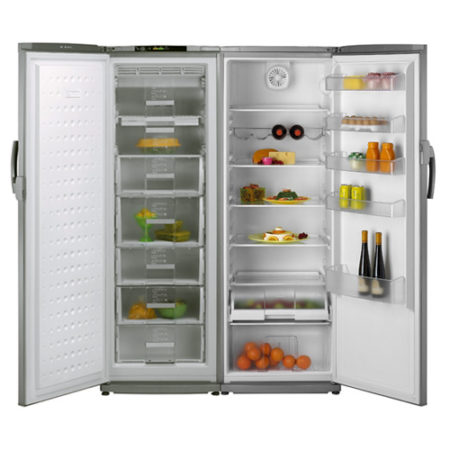
The only thing that can be noted is that each chamber has its own evaporation element, and both of these compartments are completely isolated from each other. The principle of operation of the two-chamber unit is that, before entering the refrigerator compartment, the freon first cools off with the evaporator in the freezer to a certain point, and only after cooling it enters the above compartment, where it takes heat, and everything happens according to the already described higher work cycle. As soon as the desired temperature is reached, the system stops the compressor of the refrigerator.
Today, in everyday life, two-chamber units are much more often used, in which one compressor is used for the entire system. However, there are also two-compressor units with each separate “engine” for the refrigerating and freezing chambers. This allows you to turn off a separate unnecessary compressor if necessary and stop the operation of one of the chambers without harming performance.
Absorption refrigerator
The principle of operation in these units is due to the fact that they evaporate their working mixture. Often, ammonia is used for this. The refrigerant is circulated by dissolving it in an aqueous medium. After that, this mixture of elements enters the system, and when it gets into the so-called reflux condenser, it is divided into two initial components. When after this reaction, ammonia is used, it enters the condenser, where it turns into a liquid, and the cycle repeats.
However, these types of refrigerators are rarely used in everyday life, since ammonia itself is poisonous. They are used as an alternative replacement for compressor units if it is not possible to install them.
Conclusion
We told you what the principle of operation and the device of the refrigerator, what types they are, and how the work process proceeds. This article will be able to explain to you how your unit is designed, and will help to understand the correct operation of the device.
See also:
- 10 best Atlant refrigerators according to owners reviews
- 10 best refrigerators from according to buyers
- 11 best BEKO refrigerators according to customers
- 15 best Liebherr refrigerators according to customer reviews

